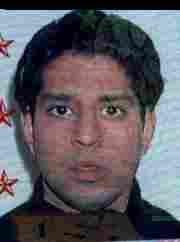Contribute
| Another Year In Guantanamo |
Vijay Shah
09/27/2006
I was a prisoner in Guantanamo.
Well, actually, last June I played a prisoner in Guantanamo, part of a dramatic reading by local residents concerned about the U.S.'s brutal detention center. Over a year ago since our last performance took place at the Central Square YMCA, my character remains captive in prison there.
Compiled by British journalists Victoria Brittain and Gillian Slovo
and co-sponsored by the Cambridge Peace Commission, "Guantanamo: Honor Bound toDefend Freedom," described the harrowing circumstances of the detainees at the U.S. military base in Guantanamo Bay, Cuba. Drawn from actual testimony from detainees, their relatives, lawyers and Secretary of Defense Donald Rumsfeld, the play told the story of young British men who ended up in Guantanamo after being picked up from countries far from the battlefield.
I played the role of the prisoner Bisher Al-Rawi. He and his brother
Wahab Muslim Iraqis fled Saddam Hussein's repressive regime to England.
Wahab became a British citizen, while Bisher retained Iraqi citizenship.
Conducting business in Gambia, they were arrested and questioned about
connections to terrorism, and held for 27 days. Given the lack of evidence, Wahab was released and sent back to Britain. Bisher, however, was taken to Bagram Air Force Base in Afghanistan and then shipped to Guantanamo, where he remains to this day.The stark divergence between the brothers' situations stoked much of the play's drama.
During rehearsals, every day brought disturbing revelations of
torture at Guantanamo. The human rights organization Amnesty International had even called the detention center, "the Gulag of our times." In addition to sexual abuse and Koran desecration, the military's own lawyers expressed concern over indefinite detention, the lack of legitimate court procedures and access to attorneys.Now we hear from Seton Hall Law Professor Mark Denbeaux that only 8 percent of detainees were identified as Al Qaeda fighters. Some 86 percent were arrested either by Pakistan or Afghan militias and turned over to the United States often in exchange for large cash bounties. Over half were not determined tohave committed any hostile acts against either America or its allies. So timely, our play strove to restore the prisoners' humanity, in the midst of such unjust brutality.
Without many lines, I really wanted to cast Bisher as a full-fledged
character.I had to imagine what my character would do all that time in his
cell. Not very religious, Bisher owned several motorcycles, and played extreme sports. So learning how to act without speech, on stage I portrayed him exercising, nursing a wound, fixing some contraption. I tried to understand Bisher's letters to his mother, which seemed to deploy sarcasm as a defense mechanism. I sought help from our profesional actor in the cast, Dev Lutra, and our director David Olson to draw out the
humor. In his final line, Bisher exclaims, Please renew my motobike insurance policy. Initially, this postscript had puzzled me. But then I recognized that riding his motorcycle was freedom for Bisher. Thus, I interpreted the prisoner's plea as imploring his audience, Get me out of here.
Since a special deal with the British government released the other
detained characters but not Bisher, I stayed in the cage well into the
discussion after the play. We intended to show that Bisher, like too many other prisoners, remained locked up in Guantanamo. Fellow actor Matt Borus noticed how my staying in character had disturbed the audience.
In performing the play, the cast truely bonded together. I met so
many wonderful people. My brother Wahab in the play, Julian Maynard and I actually felt like brothers. The play was such a memorable experience.
Bisher has also stayed with me. Before the play, I had watched
documentaries and attended talks about Guantanamo. But it was not until I had portrayed Bisher that I grasped how simultaneous everything is. The role made me see a split screen with me on one side leading my life and Bisher rotting away in prison, a counter clicking away the minutes, hours, days, years. Perhaps our false security comes at the expense of his freedom. As I reflect upon the past year, good times and bad, I realize that Bisher was deprived of all these experiences, sequestered in Guanatanmo.
Someday I would really like to meet Bisher as a free man. Far from
the barbed wire of Guantanamo, I imagine him riding his motorcycle in the
distant horizon.
Born and raised in Cleveland, Ohio, Vijay Shah works in publishing
around Boston. As a political activist, he is striving for both peace and
justice.
You may also access this article through our web-site http://www.lokvani.com/
